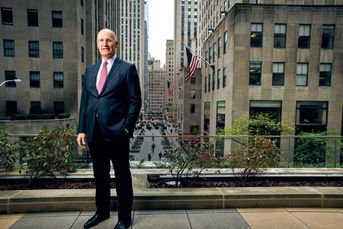For trade groups, lobbying pays
For careerists in financial-trade-group management, heading a lobbying organization backed by huge corporate interests appears to be a more lucrative route to success than serving and educating financial advisers.
According to a review of tax filings for 2008, leaders of groups with major lobbying efforts — the Securities Industry and Financial Markets Association, the American Bankers Association and the Financial Services Roundtable, for example — earned more money than those whose groups whose mission was to promote the interests of working professionals.
For example, Timothy Ryan, chief executive of SIFMA, earned $2.02 million in 2008, according to the National Journal’s recent review of the latest available tax filings from top trade groups. His predecessor, Marc Lackritz, retired that year with a compensation package worth $6.76 million, which included retirement benefits.
At the American Bankers Association, president and chief executive Edward Yingling earned $2.29 million. Another big-bank trade group honcho, Steve Bartlett of the Financial Services Roundtable, received $1.63 million in 2008.
Of 514 Internal Revenue Service Form 990 filings from non-profit organizations reviewed by the National Journal, 89 trade group executives made more than $1 million in their groups’ 2008 fiscal years. In addition to the SIFMA leaders, the lists were led by Billy Tauzin, a former congressman who as head of the Pharmaceutical Research and Manufacturers of America made $4.48 million, and Scott Serota, chief executive of the Blue Cross and Blue Shield Association, who received $3.99 million.
Not included in the National Journal list was Paul Schott Stevens, president of the Investment Company Institute. The head of the mutual fund industry’s chief lobbying group earned $1.36 million in 2007.
The ICI has filed for an extension in filing its Form 990 for 2008, said a spokeswoman for the group, “in part because it’s a new form that requires additional information.”
National Journal’s review prompted InvestmentNews to check the tax filings for the Certified Financial Planner Board of Standards Inc., the Financial Planning Association and the Investment Adviser Association.
At the CFP Board, chief executive Kevin Keller received $421,329 in total compensation in 2008, according to the latest IRS filings.
That exceeds the $366,450 that Investment Adviser Association executive director David Tittsworth earned and the $359,234 received by FPA chief executive Marvin Tuttle. Both the CFP Board and the IAA report by calendar year while the FPA’s filing reflects its fiscal year, which ran from June 1, 2008, through May 31, 2009.
At the CFP Board, managing director and attorney Michael Shaw, the group’s second-highest-paid executive, received $219,929 in total compensation and benefits.
The organization spent $2.9 million in total on salaries and wages, including $1.16 million for its officers and key employees. Its second-highest expense was $2.5 million for program services.
The CFP Board reported 2008 revenue of $16.9 million, consisting of $761,234 in investment income, $4.4 million from examination fees and $10.8 million from certification fees. Among its biggest expenses were $965,042 paid to Prometric Inc., the Baltimore testing firm that works on its exams; United Healthcare Insurance, to which it paid $348,346, and $556,892 to two temporary staffing firms.
The CFP Board also gave $1.17 million in grants to organizations that promote financial planning, down from $1.34 million the previous year. The two largest grants were $455,192 to the Financial Planning Standards Board (an international cousin) and $298,413 to Texas Tech University to increase enrollment and diversity in the school’s personal-financial-planning programs.
At the IAA, Mr. Tittsworth’s 2008 compensation inched up from $365,000 in 2007. Karen Barr, the group’s secretary, received $263,450 in 2008, up from $257,500 in 2007, and Neil Simon, its general counsel, earned $207,295.
Total staff compensation was $1.98 million, up from $1.61 million in 2007.
The IAA netted $557,113 in 2008 on revenue of $3.28 million from membership and conference fees, and $94,923 in investment income.
At the FPA for the June 2008-May 2009 fiscal year, Mr. Tuttle’s compensation included $322,859 of base pay and bonuses but was 2.8% below the $369,459 he earned in 2007.
The group’s chief financial officer, Curtis Niepoth, was paid $218,634, about flat with the previous year. Duane Thompson, who ran the FPA’s Washington lobbying office before leaving last year, earned $186,445 in fiscal 2008.
Total compensation expenses for FPA staff were $3.5 million in fiscal 2008.
The FPA netted $484,628 in the 12-month period ended May 31, 2009, which reversed a loss of $579,402 in the previous fiscal year, according to the FPA’s Form 990. Membership dues fueled $8.7 million of the FPA’s total revenue of $14.6 million.
At the National Association of Personal Financial Advisors Inc., executive director Ellen Turf was paid $202,992 in the fiscal year ended Aug. 31. Conference manager Margery Wasserman and special-project manager Nancy Hradsky each earned $105,406, according to the group’s Form 990.
NAPFA itself reported a loss of $380,250 in the 2008 fiscal year on revenue of $3.45 million and expenses of $3.8 million. Compensation comprised $1.1 million in total expenses.
In fiscal 2007, the group netted $204,494.
Learn more about reprints and licensing for this article.







